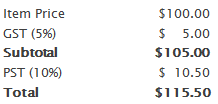Add taxes to tax groups
The information in this topic applies to non-enhanced taxes. To learn about enhanced taxes, refer to Overview: Enhanced taxes.
Taxes in a tax group can apply to guestroom blocks, base prices of menus or items, and administrative and gratuity charges. The tax that applies is controlled by the matching revenue classification. For example, your breakfast is 12.95 per person and subject to an 18.0% gratuity charge, based on the Food revenue classification. Your 4.0% local sales tax applies to the base price of a Food menu and its gratuity. When that menu is added to a booking event, the 12.95 base price and the 2.33 gratuity are automatically taxed at the 4.0% rate.
If a menu has items from multiple revenue classifications, its revenue breakdown indicates which amount of the total menu price needs to go to each revenue classification. For example, your full-service menu is 95.00 per person. The menu includes all food, beverage, and audio visual and is allocated as follows: 55 to Food, 30 to Beverage, and 10 to Audio Visual. This menu is associated with three different revenue classifications, each of which might be taxed differently.
You need to be an administrator to work with the taxes in a tax group.
To add a tax to a tax group
- In the Tax Groups section of the Property page, click the name of the tax group.
- In the Taxes section, click New Tax Group Tax. The New Tax Group Tax page displays.
- Select the Compound checkbox to apply this tax to a revenue value that includes previous taxes. For example, if an item price is $100, GST is 5%, and PST is 10%, compounding these taxes calculates as follows:

All taxes with a higher sort order in the tax group need to have the same revenue classifications and the same Applies To selection.
- In the Applies To list, indicate which charges the tax applies to.
- None - The tax does not apply to any other charges.
- Base Amount Only – The tax only applies to the item but not to the gratuity or administrative charge.
- Admin Charge - The tax applies to the item and the administrative charge.
- Gratuity - The tax applies to the item and the gratuity.
- Admin Charge & Gratuity - The tax applies to the item and the administrative charge and gratuity.
- Admin Charge Only - The tax applies to the administrative charge but not the item or gratuity.
- Gratuity Only - The tax applies to the gratuity but not the item or administrative charge.
- Admin Charge & Gratuity Only - The tax applies to the administrative charge and gratuity but not to the item.
- Select Affects Guestroom Block if this is a guestroom-specific tax. The calculated tax displays on the booking check.
- If the tax is a flat rate, select one of the following options in the Flat Rate Applies list:
- Overall - The rate applies to the entire event.
- Per Quantity - The rate applies to each consumed guestroom or menu or item.
If you select Per Quantity for a guestroom tax, the Affects Guestroom Block checkbox needs to be selected.
- Enter the tax Sort Order. This field is used with the Compound checkbox. Together, these fields decide which taxes in the tax group to include in the compound calculation and the order in which each needs to apply.
- Next to the Tax field, select the first tax to add to the tax group.
- Click Save to return to the Tax Group page.
- In the Taxes section, click the tax you just added and associate it with the appropriate revenue classifications.
Learn more...
Overview: Taxes and tax groups (Non-enhanced)
Overview: Tax group taxes (Non-enhanced)
View the details of a tax in a tax group (Non-enhanced)